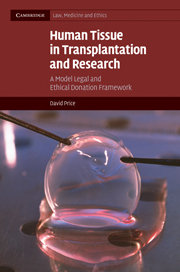Book contents
- Frontmatter
- Dedication
- Contents
- Preface
- Table of cases cited
- Table of selected statutory sources
- Introduction
- 1 Human biological materials
- 2 Interests in the living body and corpse
- 3 Eliciting wishes
- 4 Consent to donation
- 5 Presumed consent
- 6 Informed consent
- 7 Living donation
- 8 Property in human material
- Conclusion
- Index
- References
5 - Presumed consent
Published online by Cambridge University Press: 05 July 2014
- Frontmatter
- Dedication
- Contents
- Preface
- Table of cases cited
- Table of selected statutory sources
- Introduction
- 1 Human biological materials
- 2 Interests in the living body and corpse
- 3 Eliciting wishes
- 4 Consent to donation
- 5 Presumed consent
- 6 Informed consent
- 7 Living donation
- 8 Property in human material
- Conclusion
- Index
- References
Summary
Presumed consent is a central and perennial topic of transplantation debates in particular, and is viewed by many as a panacea for an insufficient supply of organs and tissues. Yet there are few topics in this sphere as divisive and productive of so much controversy and confusion. Indeed, its very character as a donation policy is something of an enigma. For my purposes here, I take ‘presumed consent’ to refer broadly to consent to be found in the failure to communicate an objection. As a matter of law, such regimes may be either hard (strong) or soft (weak). In the former, removal and use is permissible unless the deceased objected during his/her lifetime. For instance, in Austria, organs may be removed from a deceased person unless the physician is possessed of information that the individual refused consent to donation prior to death. Poland has a similar law. In weak systems, a relative (or relatives) reasonably contactable after death must also be offered an opportunity to veto donation by way of an objection. These form the majority.
In the UK presumed consent has very recently moved – surprisingly in view of its rejection in the debates leading to the Human Tissue Act 2004 – to the top of the political agenda, with the Government-established Organ Donation Taskforce (ODT) being requested to take it on board. It was also a major topic included in the US Institute of Medicine (IOM) Report, Organ Donation: Opportunities for Action, in 2006. The ODT and the IOM both considered that presumed consent should not be introduced in their respective jurisdictions at the present time. By contrast, the German National Ethics Council recently recommended that presumed consent be introduced in Germany, and the Indian Government is planning to introduce a presumed consent law (initially for corneas only). Policies have been much influenced by geographical location and social, juridical and cultural background and milieu, with the majority of European nations adopting presumed consent but relatively few others. However, even where a presumed consent is embedded in law, this is no guarantee that it is rigorously practised by all or even most professionals on the ground.
- Type
- Chapter
- Information
- Human Tissue in Transplantation and ResearchA Model Legal and Ethical Donation Framework, pp. 122 - 167Publisher: Cambridge University PressPrint publication year: 2009

